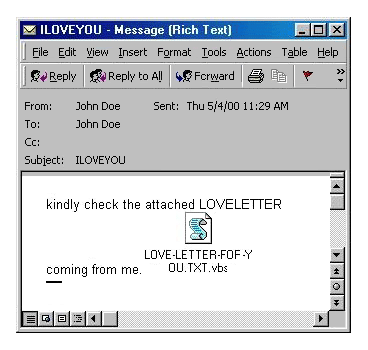ILOVEYOU is a cunningly-named virus (computer worm), and is considered one of the earliest and the world's most destructive.
ILOVEYOU, sometimes referred to as Love Letter or the Love bug. The computer worm attacked tens of millions of Windows personal computers. On local time in the Philippines, it started out when the author sent an email with a subject the line "ILOVEYOU" and the attachment "LOVE-LETTER-FOR-YOU.txt.vbs".
Opening the attachment activates the Visual Basic script.
The worm then inflicts damage on the victims' machine, overwriting random types of files (including Office files, image files, and audio files). After that, the worm hides itself, to then creates copies of itself to be sent to all addresses in the Windows Address Book used by Microsoft Outlook.
This made it spread much faster than any other previous email worm.

The generated messages began to spread first to people in Philippines, Singapore, Hong Kong, to then spread westward through corporate email systems, starting with countries in Europe, and finally the U.S. as people reported to their offices that Friday morning.
The outbreak was later estimated to have caused about $10 billion in damages worldwide with more than 50 million infections in ten days.
Messages generated in the Philippines began to spread westwards through corporate email systems.
Because the worm used mailing lists as its source of targets, the messages received by the next potential victim can often appear to come from acquaintances. Because the names are trusted, the emails were therefore often regarded as "safe" by their victims, providing further incentive to open them.
The worm was created by a Philippines citizen Onel de Guzman, originated in the Pandacan neighborhood of Manila.
When he was first apprehended, he said that his first intention to unleash the Love Bug computer worm was to steal passwords so he could access the internet without paying.

The ILOVEYOU bug, he said, was a revamped version of an earlier virus he had coded.
At the time when he created the worm, the world was still living mostly with dial-up internet connections. Passwords were needed to get online, and de Guzman said that he could not afford to pay for one.
He claimed that it was "possibly" an accident that the worm was released. Huzman said that he never intended to make it spread globally, as he regretted the damage his creation has caused.
"I didn't expect it would get to the U.S. and Europe. I was surprised," he said in an interview.
When the worm was first unleashed, and de Guzman was first apprehended, the authorities had no idea on how to charge him. It was only suggested that de Guzman should be charged with violating Republic Act 8484 (the Access Device Regulation Act).
Since Philippines had no law covering computer hacking, so neither de Guzman nor anyone else was ever prosecuted.
Decades later, in 2020, the Philippines authorities finally dismissed all charges, saying that the evidence against de Guzman had been insufficient to substantiate the charges filed against him by the National Bureau of Investigation.
The officials even thought of using the publicity surrounding de Guzman's case to advertise Philippines's inexpensive computing talent to high-technology companies abroad.
The Love Bug may have faded into history, but its story has, and will always echo in the ever-changing, virus-afflicted world.
